Top 10 Somalia Islands Culture, Customs and Etiquette
Should you remove your shoes when visiting friends? Should you greet those on elevators with a smile? When thinking about the dos and don'ts in your own ... read more...nation, these questions might not seem like the most obvious ones, but things that you might not even consider at home can have a major impact abroad. Here is a list of Somalia's Culture, Customs and Etiquette.
-
It is courteous to initially decline an offer to pay for your meal (example: "I couldn't possibly let you do that") before they insist and you gratefully accept. Being late is typical among friends and is not a sign of disrespect or rudeness. Somalis have a reputation for being very patient and keeping time in a more relaxed manner. However, in business situations, punctuality is anticipated.
To respect your Somali counterpart's modesty, dress in clothing that covers your shoulders and knees. When in public, women in particular are required to act and dress modestly. Women's hair can be unacceptable to display in public. People who are single should avoid approaching single people of the other sex.
If you are a man, publicly flirting with a Somali girl or lady is not proper. During the daylight hours of the month of Ramadan, refrain from eating, drinking, or smoking in front of a Muslim. Being seated and exposing your foot's soles to another person is impolite.
Ask for permission and respect people's privacy before snapping their picture, especially if they are women. Always give someone who is older than you a seat. When a person older than you enters a room, get up. Giving advice to an elderly person or openly disagreeing with them is extremely insulting.

https://www.pinterest.com/ 
http://morelibertynow.com -
In Somalia, offers are typically made several times. Before accepting the third offer, it is customary that you gently reject the first one. This conversation is courteous since the invitation was persistently extended, demonstrating hospitality, and the initial denial, demonstrating humility and the lack of greed.
Make sure to provide everything in return several times more. A Somali may, out of modesty and politeness, say, "No, it's okay," even though they intend to accept the second offer if you just make one.
When you compliment something at a Somali person's home, be wary since they might feel compelled to give it to you as a present. Insist that you appreciate their gesture but do not wish to accept it if they try to offer it to you. If you accept the Somali's offer of the object out of politeness, they can wind up giving you something they really wanted to keep.
In Somalia, there is a strong belief in the evil eye, which holds that someone's misfortune can be brought on by another person's envy (xasad) of their success or material things, which can occasionally take the form of a curse. Once you've acknowledged something, don't complement it again or keep praising it. A Somali person may get concerned that the evil eye will be envious of them as a result of this.
Following a compliment, people will say "Mashallah" (May God bless) to ward off the evil eye.
When receiving a compliment, be humble and grateful. This is accomplished by returning a compliment on the same subject that is similarly respectful. You can send them Allah's (God's) blessings if they practice Islam.
https://www.pinterest.com/ 
https://www.pinterest.com/ -
In Somali culture, hospitality plays a major role. Being a horrible host or providing a poor welcome is embarrassing. People treat visitors with the utmost respect and feel obligated to extend whatever hospitality they can. A family must at least offer water to a visitor even if they have no food to offer.
Refreshments, usually tea, are always made available to guests. Accepting any drink that is offered as a sign of friendship is crucial. Even if you aren't actually thirsty, refusing a drink can come across as very disrespectful and lead to misunderstandings about the friendship. Close friends, family, and neighbors may routinely pay one another impromptu visits. Having to set up a time to meet could be a challenge for a Somali.
Building and healing relationships among friends and family members depend greatly on social visiting and entertaining. A prolonged absence from someone is viewed as a symptom of the relationship's insignificance. Another reason people could decide not to see someone is to subtly express their anger or offence over what the individual did.
Remember that a Somali person's house serves as their own place of worship. As a result, it's critical to maintain cleanliness and respect. Unless otherwise instructed, take off your shoes before entering a home. In Somalia, dogs are viewed as dirty and are typically not permitted in areas where people pray (i.e. homes). As a result, having them as pets is uncommon in Somalia and people hardly ever bring them inside their homes. If you have a pet dog, let your Somali counterpart know in advance.
Do not ask them to take a seat in the spot where your dog was just taking a break. For instance, telling your dog to leave the couch and then suggesting another person sit in its place would be considered impolite. Frequently, a complete family will tour a home all at once. Typically, men and women will talk to one other privately while children play in an area apart from the adults.
Women occasionally pay one another home-lone visits. Women occasionally pay one another home-lone visits. Men frequently visit tea cafes when they want to socialize.Many homes in Somalia have separate living areas for each gender where people can socialize.
Hours can pass during visits. Sometimes, neighbors and other visitors would stop by sporadically to join the conversation. Be prepared for lengthy farewells as individuals say goodbye to one another personally and the host ushers you outside. Sometimes a chat can last a few minutes outside the guest's car.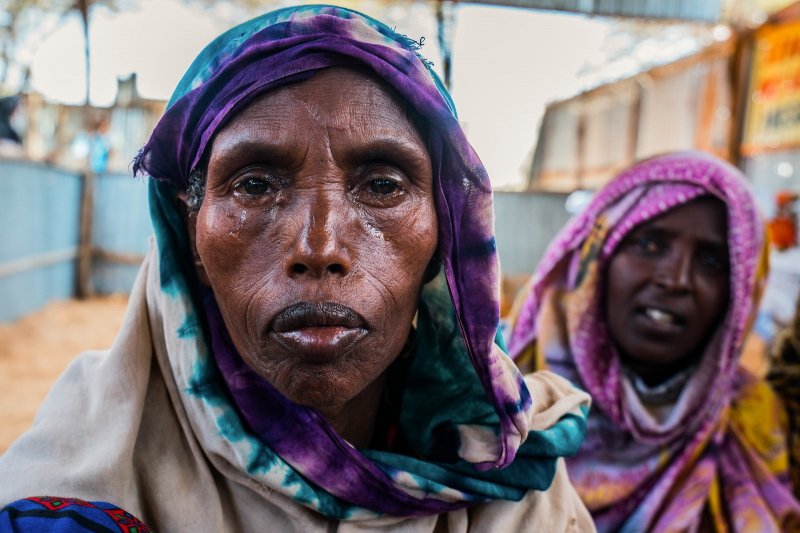
https://www.unocha.org/ 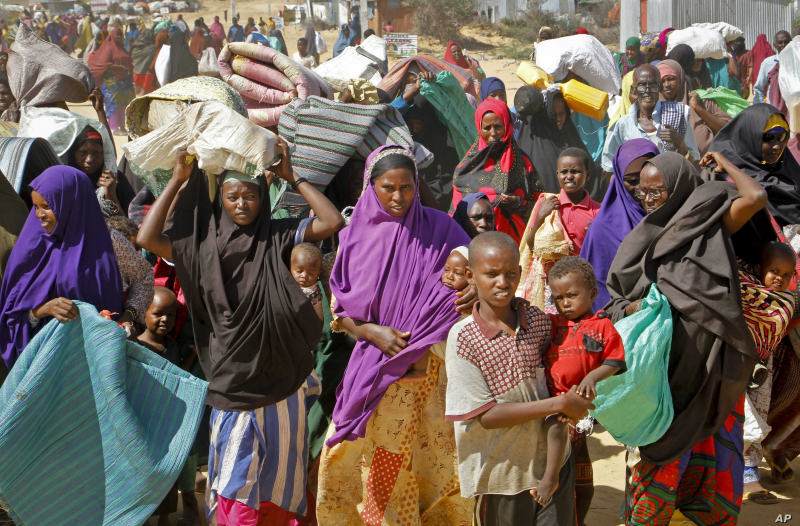
https://www.voanews.com/ -
In Somalia, lunch is typically the largest meal of the day and is typically consumed with family.
Women are traditionally expected to prepare and cook food. Typically, the males will socialize elsewhere while the ladies cook the food in the kitchen. It might not be suitable for a man to demonstrate his expertise in the kitchen or cooking to his male peers (although Somalis living overseas tend to be more relaxed about this).When dining at home, men and women typically dine in different rooms. This might also happen when going to a restaurant to eat. Before a meal is served, washing your hands is essential. Occasionally, hosts will bring visitors a basin or jug of water, so they can wash their hands at the table before and after a meal. Everyone congregates around a huge communal dish, which might be set down on a table or the floor.
Utensils are typically not needed to eat Somali food. Everybody often serves themselves from a plate using their right hand, scooping the food with their fingers. Food shouldn't be directly touched with the left hand. Injera is frequently used as a scoop. This type of pancake, which resembles a sponge, is frequently used to absorb food scraps. It is consumed with nearly every food. From the portion of the platter that is in front of you, help yourself. From the portion of the platter that is in front of you, help yourself. Reaching over to consume food that is facing other people or on the other side of the dish is rude.
Never return food that you have taken in with your hands to the dish. It's considered impolite to overeat. Only request additional dishes at special occasions. At the conclusion of the meal, it's polite to leave some food on your plate to let the host know they've served plenty. After eating, it's rude to lick your fingers. Islam forbids the consumption of alcohol and pork, which are also uncommon in Somalia. If you know your Somali counterpart is Muslim, don't offer them alcohol or pork byproducts (such gelatine). Halal criteria should be followed when preparing meat. Throughout Ramadan, avoid eating in public.
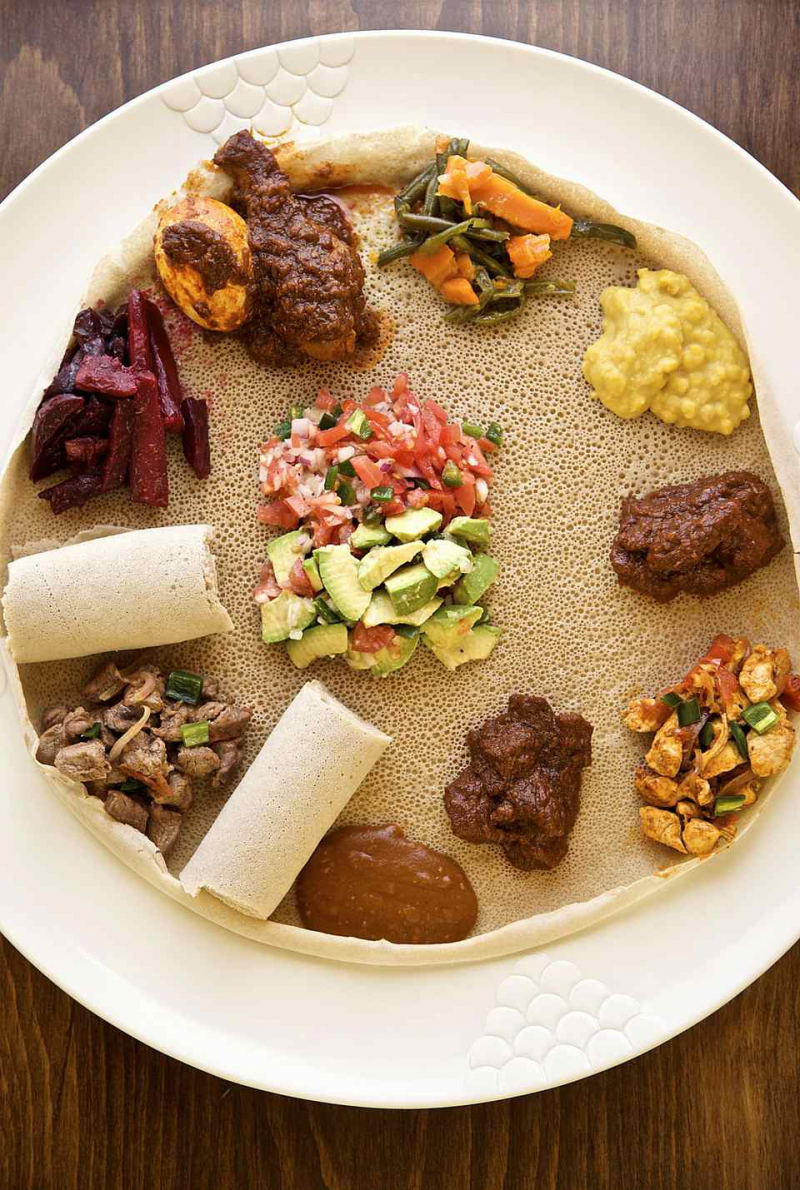
https://www.thespruceeats.com 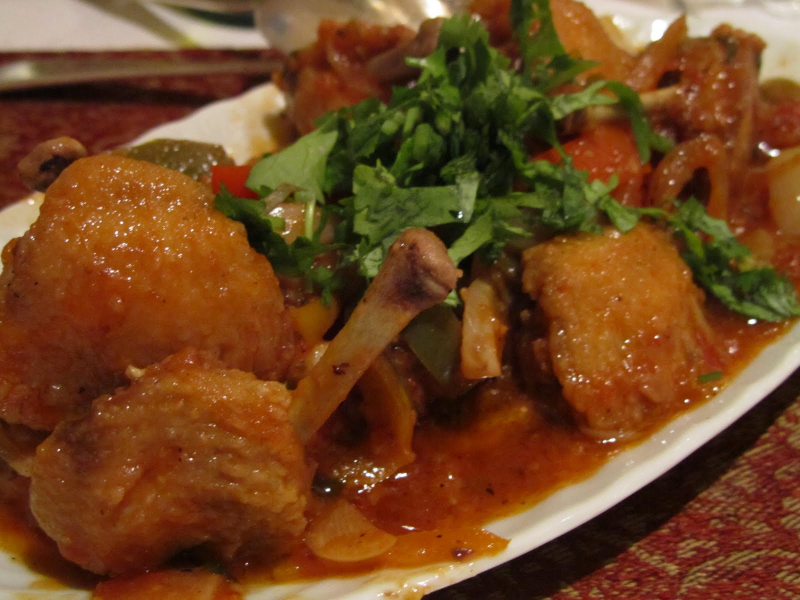
https://duhasiantakeout.wordpress.com/ -
When visiting others, people are not obligated to bring gifts. If you do, it is preferable to bring a gift intended for a child. Gifts are exchanged and accepted using either both hands together or only the right hand. The recipient typically declines the present out of modesty and politeness at least once or twice before accepting it. If you receive a rejection on your first offer, make sure to keep presenting your gift.
Anything made of pig leather, pork, or alcohol should not be given. Be aware that, unless the gift is offered as charity, there is a reciprocal expectation when giving gifts. You might not get many verbal compliments when giving a gift. Instead, gratitude could be demonstrated by being kind to others in return.
Most people give gifts when they are in need. When a Somali individual is in need, it's typical for their community to raise money online to buy them gifts. For instance, a person in the hospital might discover that as a gift from the community, all of their medical expenditures have been paid.

https://www.coinsberg.com 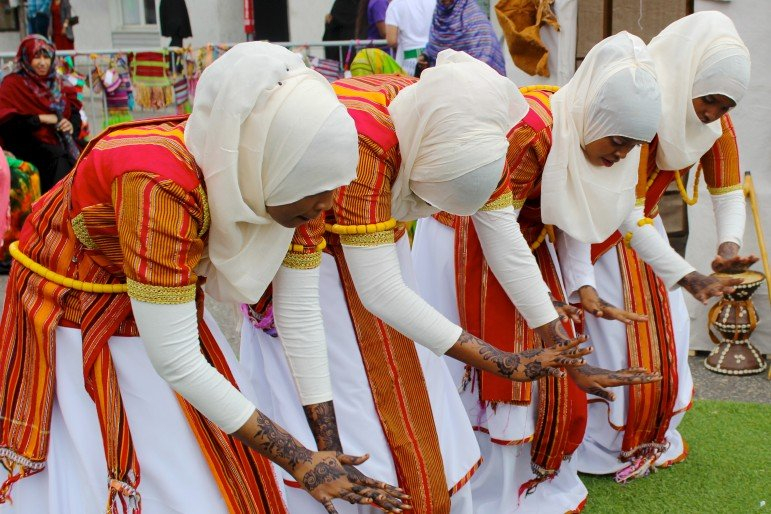
https://www.tcdailyplanet.net -
Standing up to welcome individuals you respect, especially those who are older than you, is considered polite. "See tahay?" is a standard informal salutation in Somali. How are you doing? Also heard is "Is ka warran?" "Maha la shegay" or "What's the news?" (What is being said?). These words are used to say hello and how are you.
"As-Salam Alaykum" is the standard greeting in Islam (May peace be upon you). When meeting someone older than oneself, this greeting is frequently acceptable. "Wa 'alikum assalaam" is the appropriate response (And peace be upon you). Men typically greet each other by shaking hands. Somali males often shake hands very firmly.
When welcoming someone of the opposing gender, people often avoid touching them unless they are a close family member. It, before extending his hand for a handshake, a guy should wait for a lady to do so first. Handshakes might not even be required in highly informal situations where individuals already know one another.
Women typically greet one another informally by hugging and kissing each other on the cheek. In some places, after shaking hands, women will kiss the hand they just touched. People should only be addressed by their first name. The use of formal titles or people's last names is uncommon (see Naming). Somalis may use titles like "Adeer" (uncle), "Eeda" (paternal aunt), or "Habo/Habaryar" (maternal aunt) followed by the person's first name to refer to adults they respect and feel a connection to. To use these titles, one does not need to be related to the subject.
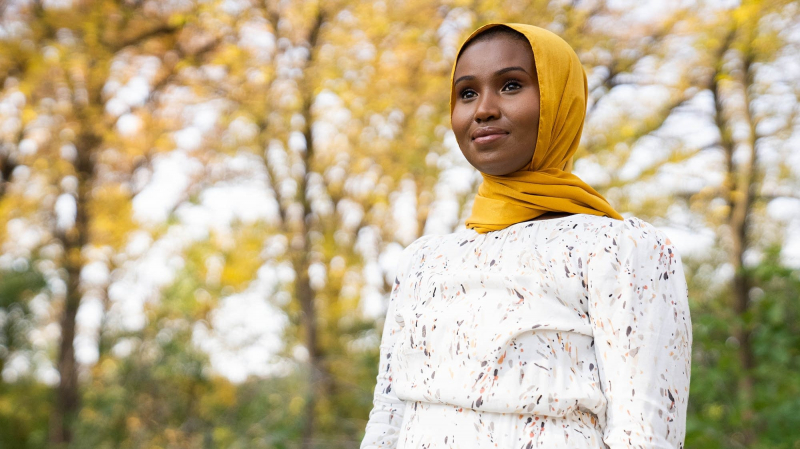
https://www.mprnews.org/ 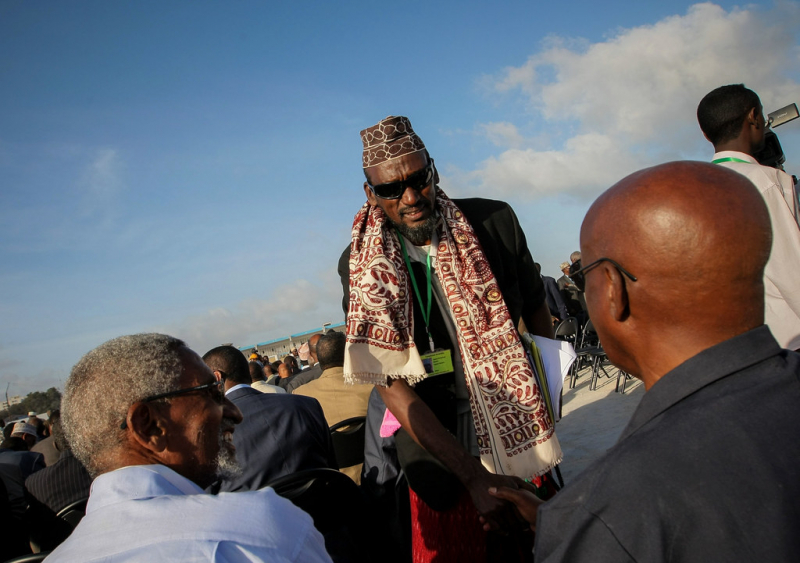
https://www.flickr.com/ -
The majority of Somalis identify as Muslims, and Islam is the official state religion of Somalia. Most adhere to the Shafi'i school of Islamic law and the Sunni branch of Islam. Islam plays a significant role in the formation of the Somali national identity, giving all Somalis a shared identity regardless of their tribe or cultural heritage.
All Somalis prioritize their religious beliefs in their daily lives. Compared to certain other Muslim African communities, Somalis tend to be more pious. The concept of a "non-practising Muslim," for instance, is extremely uncommon in Somalia, where everyone is required to practice Islam to some extent. However, Somalis are fairly tolerant within the Islamic faith despite being very religious. In fact, it's typical to hear Somalis identify as "liberal" or "moderate" Muslims.
In Somalia, which has a majority of Muslims and over 10 million residents, Christianity is a minority faith with only about 1,000 adherents. Although a small number of ethnic Somalis practiced early Christian Orthodoxy prior to the advent of Islam, the majority of contemporary Christian adherents are from the Bantu ethnic minority or are descended from Italian colonizers and are members of the Evangelical and Wesleyan Church of the Nazarene. The Diocese of Mogadi is the sole Catholic diocese in the nation.
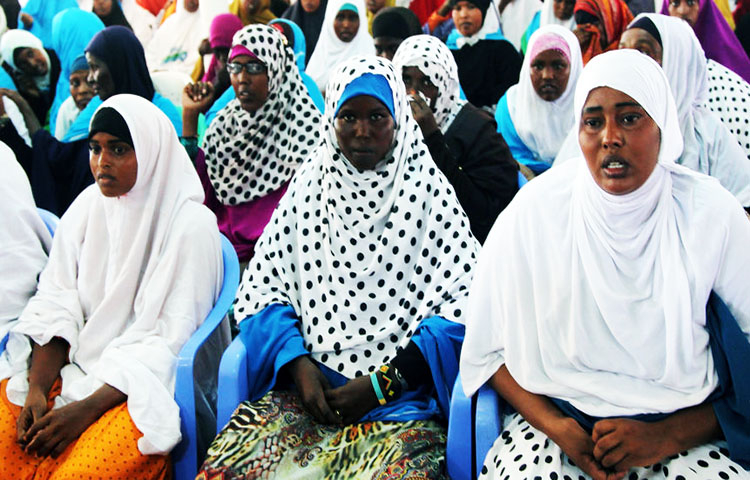
https://sooluciona.com/ 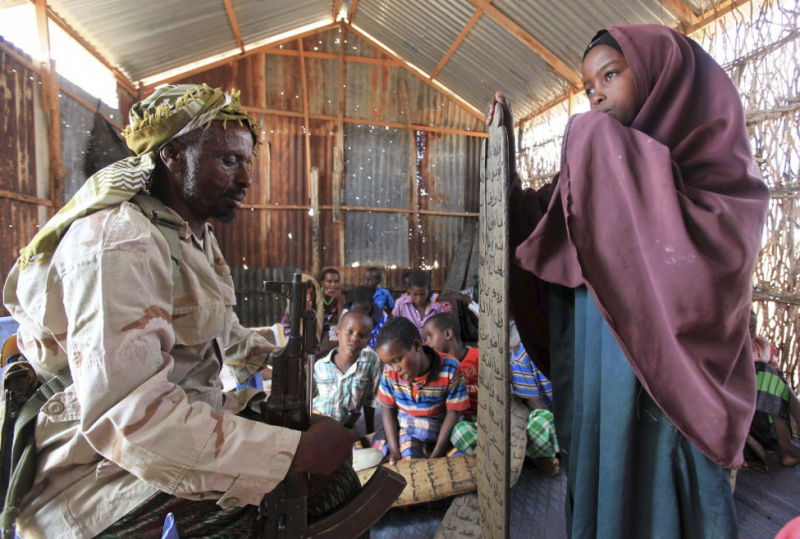
https://sites.google.com -
Somalia first encountered Islam in the ninth century (CE). Sufism-influenced moderate Islam has historically been practiced by Somalis. The Salafi movement, however, has increased its political clout in recent decades. This theory proposes a stricter reading of the Qur'an and was created in opposition to Western imperialism. It is centered on the idea of looking back in time to a previous historical era in an effort to comprehend how the modern world ought to be structured.
Most Somalis live firmly rooted Sunni Islamic personal, political, and legal traditions. Religion has a direct impact on daily life and government. Shari'a decisions influence national legislation and conventional customary law, therefore actions that violate Islamic principles are punishable by law. Blasphemy and "defamation of Islam," for instance, are crimes. The Shari'a penal code is not, however, implemented in Somalia.
The country as a whole has different interpretations of Islam and levels of conservatism. Due to the influence of jihadist islamist organisations, religious conservatism has become more visible in some areas (see below). As a result of beliefs that Muslim life in the West is growing increasingly unfriendly, some Somalis have also been noticed to be experiencing pressure to live as a "good" Muslim. Somalis who live abroad could also feel pressured to lead more religious and moral lives than they did back home in order to protect themselves from being corrupted by non-Muslim influences.
People regularly display their faith by their attire, dietary restrictions, regular prayer, and frequent allusions to Allah's (God's) will or blessing. One can see that many individuals revere Allah by the way they speak; it is normal to weave praise of Him into everyday conversations. Furthermore, it is common for Somalis to include God in future predictions that commonly end with the phrase "Inshallah" (Arabic for "God willing") This demonstrates the widespread conviction that God's will ultimately determines the course of events. Every Friday, men gather for special prayer services at almost every town's mosque.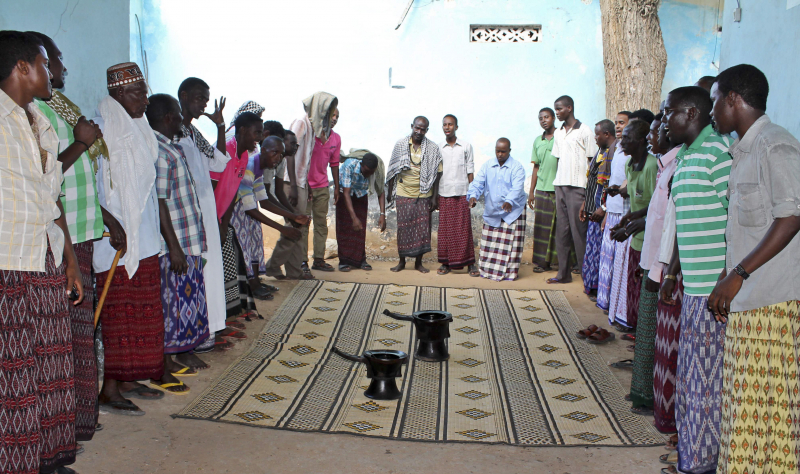
https://news.yahoo.com/ 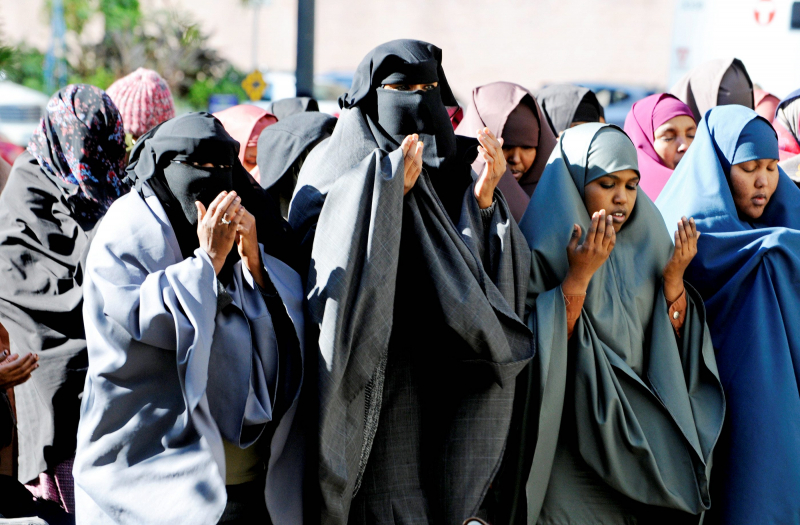
http://www.aim.org/guest-column/ -
A sizable Sufi community, a little Christian community, and an undetermined number of Shi'a Muslims all reside in Somalia. Immigrants and foreign workers, mostly from East African nations, make up a large portion of members of minority religious organizations. Although a small number of ethnic Somalis practiced early Christian Orthodoxy prior to the advent of Islam, the majority of contemporary Christian adherents are from the Bantu ethnic minority or are descended from Italian colonizers and are members of the Evangelical and Wesleyan Church of the Nazarene.
Islam to another faith conversion is socially unacceptable everywhere. In areas under Al-Shabaab control, those suspected of conversion may experience abuse from members of their community and suffer grave danger. Minority Muslim groups are among the religious minorities who may face prosecution for blasphemy and apostasy under Islamic law.
Sufism is experiencing a rebirth as some Somalis turn away from Salafism due to the conduct of terrorist offshoot groups like Al-Shabaab. Sufism is viewed by some as a spiritual alternative that is apolitical.
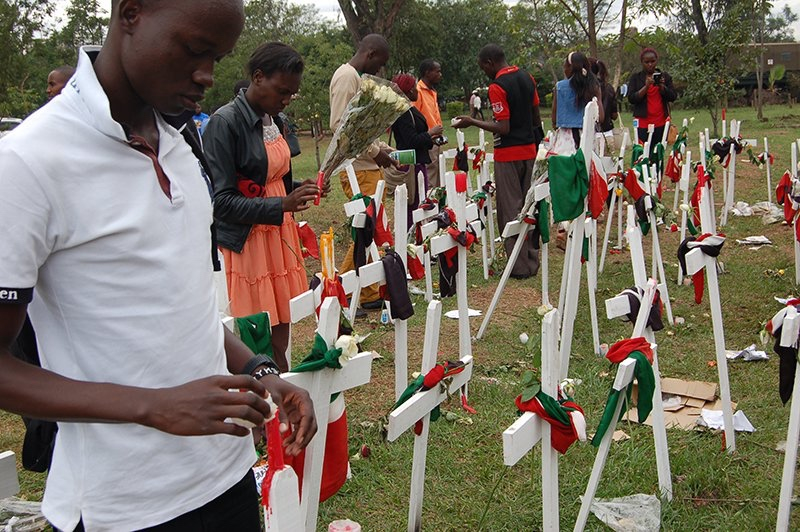
https://www.sightmagazine.com.au 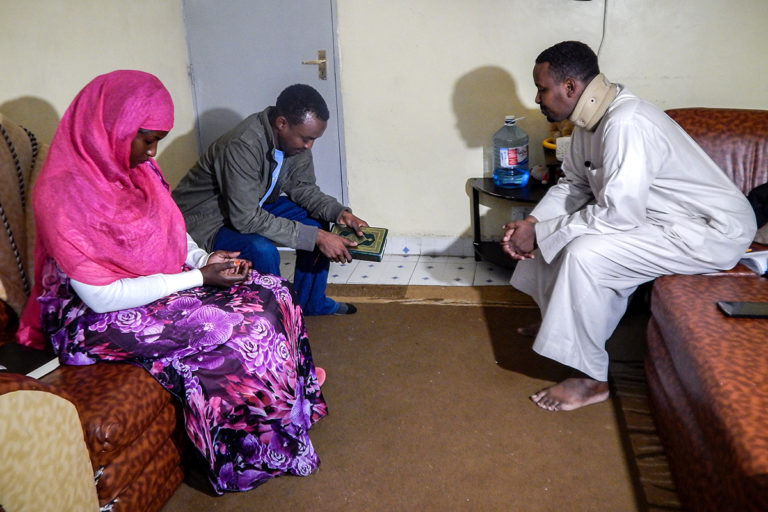
https://seattleglobalist.com -
In Somalia, dating customs as they are understood in the English-speaking West, are essentially nonexistent. Many young Somali men and women may communicate more frequently online or through mobile devices today. However, unless the two people are married, it is deemed undesirable to socialize with a member of the other gender alone. Men and women who are not married should only speak to each other in public or during community events. It is thought that if they become close, they will declare their engagement.
In Somali culture, marriage is both a social and religious requirement. It symbolizes the joining of a couple and their family. A woman who marries a member of another clan becomes a member of that clan (although she maintains connection and legal ties with her original clan). Marriages between clans were fairly prevalent before the American Civil War. Intermarriage was sometimes utilized to create new clan relationships. Nowadays, Somalis frequently favor getting married inside their subclans. However, Somalis who reside abroad typically don't consider this matter as seriously.
Marriages are customarily arranged, although each partner is typically given the freedom to accept or reject the match that has been made by their families. Parents are increasingly more likely to think about their child's love interest if the fit is right. A woman who marries a member of another clan becomes a member of that clan (although she maintains connection and legal ties with her original clan). Marriages between clans were fairly prevalent before the American Civil War. Intermarriage was sometimes utilized to create new clan relationships. Nowadays, Somalis frequently favor getting married inside their subclans. However, Somalis who reside abroad typically don't consider this matter as seriously.
Marriages are customarily arranged, although each partner is typically given the freedom to accept or reject the match that has been made by their families. Parents are increasingly more likely to think about their child's love interest if the fit is right. Women from rural areas and lower socioeconomic levels typically get married young, starting at age 15 and rarely waiting until they are 21. Those who are educated and urbanized might wait until they graduate from college, but they should plan to get married by the age of 25 at the latest. By the time they turn 18 years old, 45% of women are married (35% in urban areas and 52% in rural areas), according to UNICEF. 7 Boys often marry later in life, at around 30. Men are supposed to support their wives financially, which is why there is an age difference between them. Therefore, a man must be completely self-sufficient and financially comfortable before getting engaged.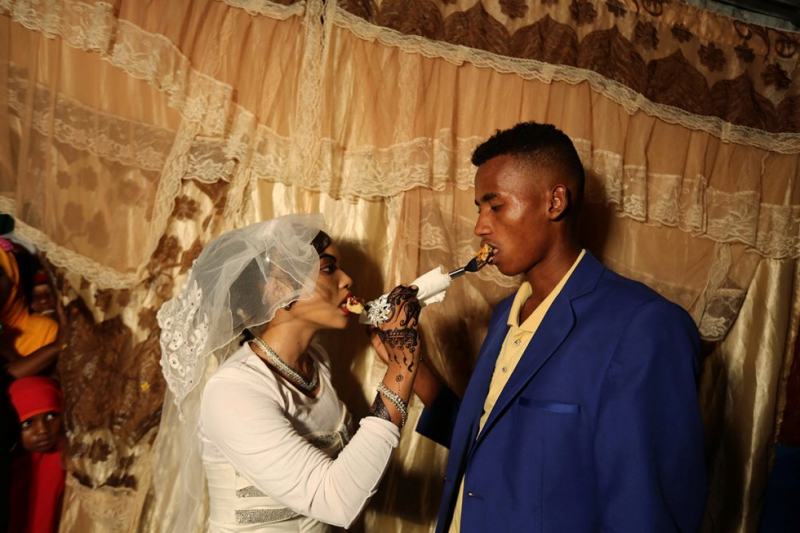
https://www.yabaleftonline.ng/ 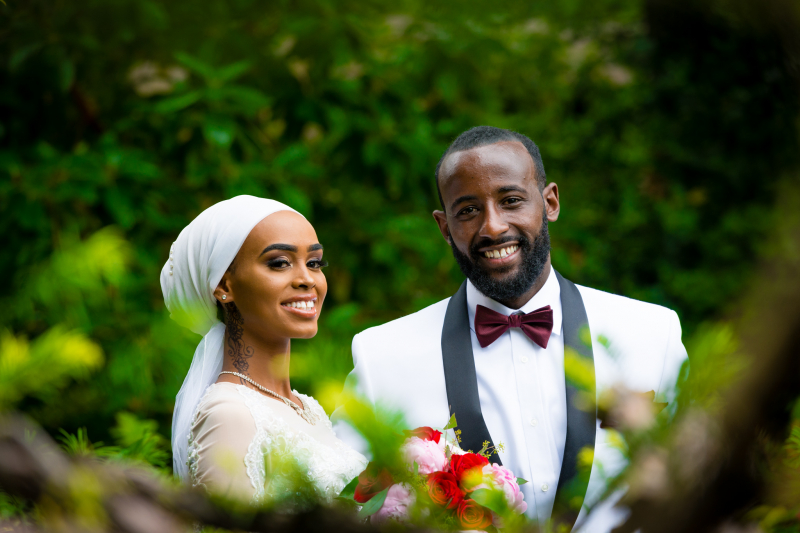
http://www.mariusphoto.com/































